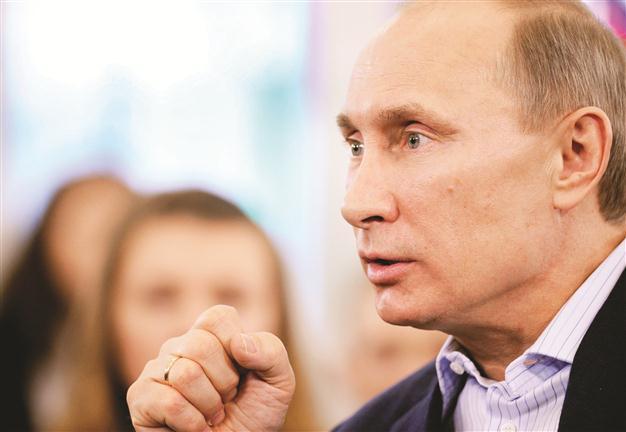Russia’s wind of change to boost state capitalism
MOSCOW - Reuters

Russian Prime Minister Vladimir Putin gestures as he meets with local students in the city of Tomsk, Jan 25. The state will keep on investing in sectors risky for private business, Putin says. REUTERS photo
Prime Minister Vladimir Putin, seeking to renew his hold on power after unprecedented street protests, set out an economic agenda yesterday that puts state capitalism at the heart of a bid to boost Russia’s global competitiveness.In a 5,000-word newspaper article, the third in a series he has written ahead of a March 4 presidential election, Putin defended his record while acknowledging Russia needed to adapt in a period of “cardinal change” in the global economy.
“We are seeing how countries, whose position seemed invulnerable only yesterday, are yielding to those that not long ago were regarded with haughty disdain,” he wrote in the Vedomosti financial daily.
“In such conditions it is important to secure the stable and gradual development of our economy, and as far as possible to protect our citizens from blows delivered by crises, while resolutely and quickly renewing all aspects of economic life.”
Putin said his government had been right to reassert control over the energy sector, an indirect reference to the breakup of Russia’s largest oil firm, Yukos, whose assets were largely bought up by state-controlled Rosneft and whose owner, Mikhail Khodorkovsky, was jailed for tax evasion and fraud.
The article, Putin’s broadest discourse on how he would run the economy should he be elected for a six-year term, also identifies continuing dependency on natural resources and de-industrialization as Russia’s greatest economic weaknesses.
But the steps he proposes to modernize the $1.5 trillion economy lack detail, are in part contradictory and make only a vague commitment to deliver on past privatization pledges. Putin is the clear front-runner to win the presidential election, but the popular mood has shifted in Russia after tens of thousands of protesters turned out to protest alleged ballot fraud in a December parliamentary election. Critics plan to turn out again in force on Feb. 4 to demand wide-ranging electoral reforms.
‘Organic part of the globe’
In the 20 years since the collapse of the Soviet Union, Russia has become “an organic part of the world economy,” but is still exposed to commodity-price swings, reliant on imports of consumer goods and plagued by capital flight, Putin wrote.
Russia, as a member of the World Trade Organization, should open up to global competition and become a leader in sectors like pharmaceuticals, composite materials, aerospace and communications technology.
But Putin also defended his support for an active industrial policy, saying: “Private capital will not voluntarily enter new sectors as it does not want to bear elevated risks.”
Bulking up state corporations active in high technology, infrastructure and nuclear power would presage their conversion into public firms that can be floated on stock markets.
“I consider it possible for the state, by 2016, to reduce its stakes in some resource companies and to complete its exit from large non-resource companies that are not tied to natural monopolies and the defense sector,” Putin wrote.
Putin’s article mentioned corruption explicitly only once and said efforts by outgoing President Dmitry Medvedev had failed to eliminate pressure from officials on entrepreneurs.
“The main problem is insufficient transparency and accountability on the part of state officials,” Putin wrote. “To call it by name, we are talking about systemic corruption.”
“Clearing the way for business that is ready to win in fair competition is a fundamental, systemic task ... We need to change the state itself - executive and judicial power.”
















